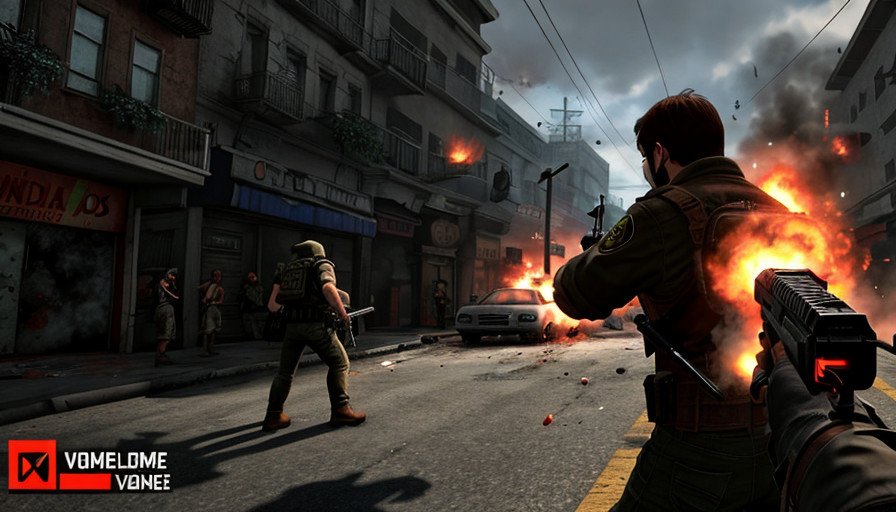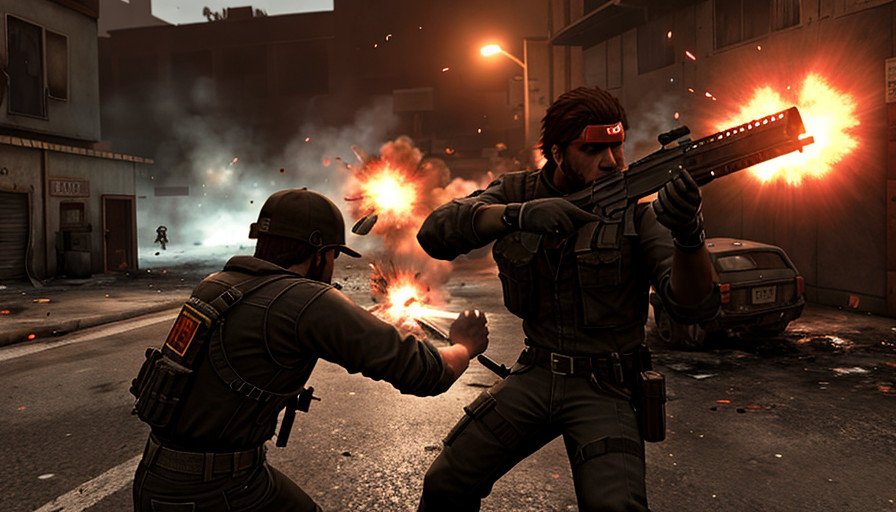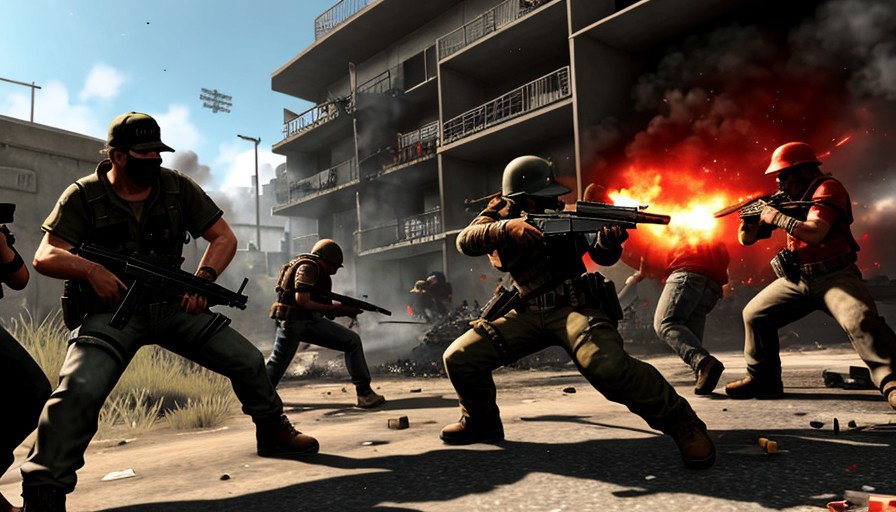Video games have become a significant part of popular culture, with a wide range of genres catering to diverse tastes and interests. One of the most contentious aspects of video games is their depiction of violence. This article explores the ethical implications of video game violence, examining the potential effects on players and the broader society.
Navigate the complex interplay between virtual aggression and real-world consequences as we analyze the ethics of video games. Join the conversation on the impact of interactive entertainment on society and morality, gaining insights into the ever-evolving relationship between gamers, developers, and the broader ethical discourse.
Uncover the nuances of this compelling dialogue and gain a deeper understanding of the ethical dimensions within the world of video games.
What Is Video Game Violence?
Video game violence refers to the depiction of aggressive acts, including physical harm, killing, and destruction, in video games. These acts can range from mild fights to extreme acts of violence, and they are often portrayed in a graphic and exaggerated manner to increase the excitement and engagement of players.
The level of violence in video games can vary widely depending on the game. Some games may feature mild violence, such as fist fights or mild physical harm, while others may feature extreme violence, including acts of murder, torture, and warfare. The violence in video games is often disconnected from the consequences of such actions, as characters can often be brought back to life or healed instantly.
Video game violence is often a subject of debate and controversy. Some critics argue that the graphic and exaggerated depiction of violence in video games can desensitize players to real-world violence and lead to increased aggressive behavior. On the other hand, proponents of video games argue that they are a form of entertainment and art, and that the violence in these games is fictional and does not have any real-world consequences.
The effects of violent video games on players can vary depending on a variety of factors, including the player’s age, gender, personality, and environment. Some studies suggest a link between exposure to violent video games and increased aggressive behavior, while others argue that the link is weak or non-existent.
It’s also important to note that the depiction of violence in video games is not limited to violent video games. Many video games, regardless of their genre, may feature some level of violence. The key factor is the level and nature of the violence, and whether it is presented in a way that is graphic, exaggerated, and disconnected from the consequences of such actions.
The Effects of Video Game Violence
Research suggests that violent video games can have a significant impact on players. A 2018 meta-analysis found a small increase in real-world physical aggression among adolescents and pre-teens who play violent video games m.
This study, led by Jay Hull, a social psychologist at Dartmouth College, pooled data from 24 previous studies to avoid some of the problems that have made the question of a connection between gaming and aggression controversial. The studies tracked physical aggression among users of violent video games for periods ranging from three months to four years.

However, it’s important to note that the effect sizes are small, and they’ve been similar across many studies, according to the American Psychological Association’s 2015 resolution. The violence the APA resolution documents is more mundane and involves the kind of bullying that, while often having dire long-term consequences, is less immediately dangerous.
The Ethics of Video Game Violence
The ethical implications of video game violence are complex. Some argue that video games are morally objectionable due to their capacity to teach players weapon skills and their potential to directly cause violent actions. However, others defend the morality of violent video games, arguing that they can be defensible from the perspective of Kantian, Aristotelian, and utilitarian moral theories.
Kantian ethics focus on the inherent goodness of all individuals and the categorical imperative to treat others as ends in themselves. From this perspective, violent video games can be seen as a form of entertainment that does not devalue the inherent worth of individuals.
Aristotelian ethics, on the other hand, focus on the mean or the golden middle. From this perspective, violent video games can be seen as a form of entertainment that does not devalue the inherent worth of individuals.
Utilitarian ethics, which focus on the greatest good for the greatest number, argue that violent video games can be justified if they provide a form of entertainment that does not cause harm to others.
The Role of Parents and Society
The role of parents and society in regulating video game violence is also important. Parents and society should be mindful of the types of games their children are playing and the potential effects of these games on their behavior. This includes monitoring the content of the games, setting appropriate boundaries, and providing positive alternatives for entertainment.
What are some examples of violent video games?
There are numerous video games that are known for their violent content. Here are a few examples:
- Mortal Kombat: This is one of the most iconic and controversial fighting games, known for its brutal and graphic violence. The game’s characters are often depicted in violent and gruesome ways, making it a standout example of violent video games.
- Call of Duty: Modern Warfare 2: This game has a controversial “No Russian” scenario where players have the option to slaughter innocent civilians in an airport. This scenario is often cited as one of the most violent moments in video game history.
- Grand Theft Auto V: This open-world action-adventure game is notorious for its graphic violence and depiction of criminal activities. It also includes elements of violence against women, which have led to controversy and censorship in some regions.
- Doom: This first-person shooter game is known for its intense and bloody gameplay. It has been linked to several real-world mass shootings, further fueling the debate over the relationship between violent video games and violent behavior.
- GoldenEye 007: This first-person shooter game is known for its realistic depiction of espionage and violence. It has also been linked to several real-world mass shootings, similar to Doom.
- Counter-Strike and Far Cry 2: These first-person shooter games have been linked to the Winnenden school shooting in Germany. The shooter was found to have an interest in these games.
Remember, while these games are known for their violent content, the relationship between violent video games and violent behavior is a complex and controversial topic. Some studies suggest a link, while others do not. It’s also important to note that video games are a form of entertainment and art, and like any medium, they reflect the society and culture in which they are created.
How does the level of violence in violent video games compare to real-world violence?
The level of violence in violent video games is often much more exaggerated and graphic than real-world violence. This is due to the fact that video games are a form of entertainment and art, and their primary goal is to entertain and engage players. They often depict violence in a way that is meant to be shocking and exciting to players, rather than realistic or believable.
For example, in video games, characters can be killed in gruesome and violent ways that would not be possible or legal in real life. They can also inflict extreme amounts of damage on each other, which would be impossible in reality. Furthermore, video games often depict violence in a way that is disconnected from the consequences of such actions, as characters can often be brought back to life or healed instantly.

In contrast, real-world violence is often much more immediate and personal, with physical injuries and death being real consequences of violence. Real-world violence is also often associated with trauma, long-term psychological effects, and legal consequences.
However, it’s important to note that while the level of violence in video games is often exaggerated, this does not necessarily mean that it is harmless. Some research suggests a link between exposure to violent video games and increased aggressive behavior in some individuals.
However, the relationship between violent video games and violent behavior is complex and not fully understood, and more research is needed to fully understand these potential effects.
How do video games affect a player’s perception of real-world violence?
The relationship between violent video games and a player’s perception of real-world violence is complex and a subject of ongoing debate. Some studies suggest that exposure to violent video games can lead to increased aggressive behavior, while others argue that the link is weak or non-existent.
Research conducted by Jay Hull, a social psychologist at Dartmouth College, found a small increase in real-world physical aggression among adolescents and pre-teens who play violent video games. However, the effect sizes are small and they’ve been similar across many studies, according to the American Psychological Association’s 2015 resolution.
The violence the APA resolution documents is more mundane and involves the kind of bullying that, while often having dire long-term consequences, is less immediately dangerous.
On the other hand, a study published in July 2019 looked at more than 3,000 youth in Singapore and found no link between violent games and future aggression. The study suggested that a positive family environment was a “protective factor” that reduced aggression and antisocial behaviors.
In terms of perception, playing violent video games can potentially desensitize players to real-world violence. This is because the violence in video games is often exaggerated and disconnected from the real-world consequences of violence. Players may become accustomed to the graphic and brutal violence depicted in these games, which could potentially affect their perception of real-world violence.
However, it’s important to note that the relationship between violent video games and a player’s perception of real-world violence is influenced by a variety of factors, including the individual’s personality, their environment, and their exposure to violence in other forms of media. Therefore, more research is needed to fully understand these relationships.
How do different age groups and genders respond to violent video games?
The response to violent video games can vary significantly among different age groups and genders. Here are some key findings based on the provided sources:
Age Groups
Research indicates that the effects of violent video games can vary depending on the age of the player. A study involving students aged between 9 and 17 years found that violent video games could potentially lead to increased aggressive behavior. However, the study also noted that the effects were small and could be influenced by other factors, such as the player’s environment and their normative beliefs about aggression.
Genders
A study found that boys were more likely to have high scores of exposure to violent video games and normative beliefs about aggression compared to girls. This gender difference could potentially influence how each gender responds to violent video games. For instance, boys might be more likely to engage in aggressive behavior after playing violent video games, while girls might be more likely to develop negative beliefs about aggression.
Family Environment
The family environment can also play a significant role in how a player responds to violent video games. For individuals with a good family environment, exposure to violent video games only has a direct effect on aggression. However, for those with a poor family environment, there is an indirect effect mediated by normative beliefs about aggression alongside a direct effect.
Normative Beliefs About Aggression
Normative beliefs about aggression, which refer to an individual’s assessment of aggression acceptability, are directly related to aggression. Studies found that normative beliefs about aggression are significantly positively related to online aggressive behavior, which is the most important determining factor of adolescent cyberbullying. Teenagers with high normative beliefs about aggression are more likely to become bullies and victims of traditional bullying and cyberbullying.

In conclusion, the response to violent video games can vary significantly among different age groups and genders, and can be influenced by a variety of factors, including the player’s family environment and their normative beliefs about aggression. Therefore, it’s important for parents and educators to be aware of these potential effects and to take steps to mitigate any negative impacts.
More information on the study that found violent video games can lead to increased aggressive behavior among students aged 9-17.
The study you’re referring to is titled “Violent Video Game Exposure and Problem Behavior in Children and Adolescents: A Meta-Analysis” and was conducted by researchers at Xiamen University in China. The study aimed to investigate the correlation between violent video game exposure and problem behavior in children and adolescents.
The researchers used the Violent Video Game Exposure Questionnaire, which asked participants to list three violent video games they had most recently encountered and to rate the frequency and violence of each game. The degree of exposure to violent video games was calculated as the sum of the violent content multiplied by the frequency of using games, divided by three.
The study found a significant positive correlation between exposure to violent video games and problem behavior in children and adolescents. The researchers suggested that violent video game exposure could increase aggressive cognition, emotion, and behavior, and decrease empathy, which could negatively impact players’ social behavior.
However, the study also noted that the effects were small and could be influenced by other factors, such as the player’s environment and their normative beliefs about aggression. For instance, the study found that normative beliefs about aggression could mediate the relationship between violent video game exposure and aggression n.
The study concluded that violent video game exposure positively correlates with problem behaviors among children and adolescents. However, more research is needed to fully understand these relationships and to develop effective strategies for mitigating any potential negative effects.
Conclusion
In conclusion, the ethics of video game violence is a complex issue. While there is evidence to suggest that violent video games can increase aggressive behavior, the effect sizes are small and the interpretation of aggression is subjective. Furthermore, the ethical implications of video game violence can be defended from various moral perspectives.
Ultimately, the role of parents and society in regulating video game violence cannot be underestimated. By being informed and proactive, we can navigate this complex issue in a way that promotes the well-being of all individuals involved.You need to read another article i wrote about >>>> the uture of video game violence to learn more.






